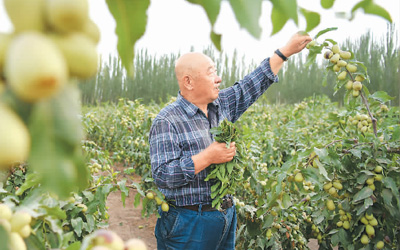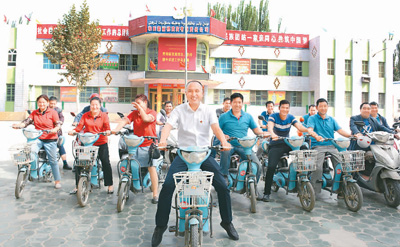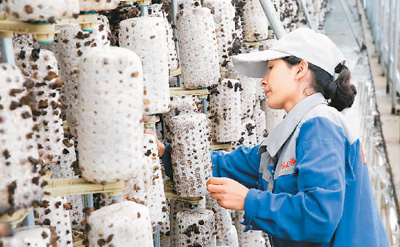


Aerial photo of Tuanjie new village, a relocation site for poverty alleviation in Hotan Prefecture. (Photo/Xu Xiaolong)
Thanks to favorable government policies and joint efforts to develop specialty industries, people in Hotan Prefecture, northwest China’s Xinjiang Uygur Autonomous Region, have witnessed significant improvements in their living standards and see a bright future ahead.
With per capita arable land of 0.8 mu (about 533.33 square meters), annual rainfall of less than 40 millimeters, and more than 200 days of floating dust weather a year, Hotan, which is at the end of Xinjiang’s transportation network, has long suffered extremely harsh conditions.
However, with China’s poverty alleviation campaign proceeding steadily over the last few years, the prefecture has seen comprehensive improvement in various aspects of life.
Local roads and dwellings have been renovated, and healthcare conditions have been greatly improved, thanks to China’s efforts to enhance the coverage and benefits of medical insurance for citizens.
Rozi Seydi, who used to work as a “barefoot doctor” providing basic medical services for local residents of Qoltuq Village, Kokyar Township, Yutian County, Hotan Prefecture, began working as a doctor at the village clinic two years ago.
Not long after Seydi got the job, his youngest daughter was diagnosed with cardiac perforation, and needed to receive immediate treatment in bigger hospitals in Urumqi, capital of Xinjiang. At first, Seydi was worried that the medical fees would overwhelm his family. However, as his family was one of the poor households in the country, Seydi received reimbursement for 95 percent of the medical costs.
In 2017, Yutian County launched a household medical services program just like other counties in the region had done. Under the program, the township’s health center arranged for two doctors to visit the village every month, conducting health examinations in people’s homes.
Thanks to the move, diseases such as phthisis received immediate and proper medical treatment, and patients with chronic diseases like hypertension and diabetes had medicine delivered to their homes regularly, greatly improving the health condition of local residents.

Li Peng prunes date trees in Arish Village, Chira County, Hotan Prefecture. (Photo by Ding Lei/Xinhua)
“My phone number is on the wall of every local family. We can get to their homes whenever there is an emergency,” said Seydi, who has become busier and more energetic over these years.
An airport will be built in Yutian County, according to Seydi, adding that in the future, when they need to seek medical treatment at bigger hospitals, they will be able to take a plane to Urumqi.
In addition to medical conditions, the living standards of people in Hotan Prefecture have also improved significantly over these years.
Li Peng, a 68-year old retiree from Chira County, hired more than 100 Uyghur people to work in his orchard. This September, the monthly salary of an employee reached 5,571 yuan (about $796.03).
Ten years ago, just after he had retired from his job and decided to plant date trees in the village, many local people thought he was out of his mind. However, after unremitting efforts and considerable investment, the date trees started to yield large volumes of fruit. It turned out that the alkaline sandy soil, long sunlight hours, and drastic temperature difference between day and night provide excellent conditions for date trees to grow.
Li has also taught his plantation skills to the local villagers, who started running their own date orchards after they mastered the techniques, securing another path to prosperity.
Last year, a preliminary date processing factory was built near Liho orchard, which has helped to significantly increase the prices of the local dates.
Today, the annual per capita net income of the residents of Arish Village has reached 9,369 yuan, more than 1,000 yuan higher than that of the average annual per capita net income in Chira County.
Just 10 years ago, over 90 percent of the people in Arish Village were impoverished, and the per capita annual income of the residents was 2,173 yuan.

Obulhasan Obulqasim (fourth from left) and employees from his clothing factory. (Photo/Yusup Mettursun)
Obulhasan Obulqasim is one of the local young people who run their own business in their hometowns.
In 2010, 31-year old Obulqasim returned to his hometown in Moyu County with the money he earned as a migrant worker. As he was optimistic about the abundant rural labor force of southern Xinjiang, Obulqasim decided to establish a clothing factory in Zawa Township of Moyu County, helping creating job opportunities for his fellow villagers.
Obulqasim set up his business at a workshop with an area of less than 100 square meters, 20 sewing machines, and 29 employees. In 2013, he visited garment factories in Jiaxing City, east China’s Zhejiang Province, three times, and hired Wang Enming, a man of Han nationality with rich experience in design and manufacturing of clothing.
Today, Obulqasim owns a clothing processing empire in the locality, with the head office covering an area of more than 10,000 square meters and 11 smaller factories operating in other counties and cities in the region.
The company will move into a nearby industrial park in the next year, when the number of people who work in Obulqasim’s clothing business will increase to more than 2,500. Most of the employees are from poor households. Some skillful cutters in the company earn more than 10,000 yuan per month.
Obulqasim’s business has attracted college students who have studied in other regions of the country.
Abliz Ehmetniyaz, a graduate of Fudan University, a renowned Chinese university in east China’s Shanghai, joined the company in 2014, and quickly became the general manager of the clothing factory.
Ehmetniyaz earns more than 100,000 yuan a year, and has not only renovated his family’s old house, but bought two cars.
Ehmetniyaz has renewed his contract with the company for five more years. “It feels great working here,” said the young man.
Local governments have also made great efforts to develop specialty industries suited to local conditions.

A worker of the edible fungus manufacturing factory in Lop County of Hotan Prefecture picks black fungus. (Photo/Xu Xiaolong)
In 2017, Dongkuzleng Village of Lop County, Hotan Prefecture, started to explore the possibility of reducing poverty by developing an edible mushroom industry. In less than a year, the village built a black fungus manufacturing plant, providing jobs for more than 130 villagers living nearby.
“I have adapted well to my new life. I go to work every day at a certain time, just like people working in cities. There is a morning traffic peak at around 9 a.m. every day in the village,” said Tajinisa Tohtiweli, a worker at the fungus factory.
In 2018, there were more than 100,000 local industrial workers in Hotan Prefecture like Tohtiweli, and the number is still rising.
Every county of Hotan Prefecture has established technical training schools, offering courses for local people on a variety of practical skills for free.
This year, Hotan Prefecture has managed to lift 271,000 people out of poverty. By the end of 2020, the prefecture will help all the local residents get rid of poverty and realize the dream of building a moderately prosperous society together with Chinese people across the country.
“I don’t have any worries now. I just want to work harder and learn more skills in the factory,” said Tohtiweli, adding “my family will definitely shake off poverty next year”.
 Fire brigade in Shanghai holds group wedding
Fire brigade in Shanghai holds group wedding Tourists enjoy ice sculptures in Datan Town, north China
Tourists enjoy ice sculptures in Datan Town, north China Sunset scenery of Dayan Pagoda in Xi'an
Sunset scenery of Dayan Pagoda in Xi'an Tourists have fun at scenic spot in Nanlong Town, NW China
Tourists have fun at scenic spot in Nanlong Town, NW China Harbin attracts tourists by making best use of ice in winter
Harbin attracts tourists by making best use of ice in winter In pics: FIS Alpine Ski Women's World Cup Slalom
In pics: FIS Alpine Ski Women's World Cup Slalom Black-necked cranes rest at reservoir in Lhunzhub County, Lhasa
Black-necked cranes rest at reservoir in Lhunzhub County, Lhasa China's FAST telescope will be available to foreign scientists in April
China's FAST telescope will be available to foreign scientists in April "She power" plays indispensable role in poverty alleviation
"She power" plays indispensable role in poverty alleviation Top 10 world news events of People's Daily in 2020
Top 10 world news events of People's Daily in 2020 Top 10 China news events of People's Daily in 2020
Top 10 China news events of People's Daily in 2020 Top 10 media buzzwords of 2020
Top 10 media buzzwords of 2020 Year-ender:10 major tourism stories of 2020
Year-ender:10 major tourism stories of 2020 No interference in Venezuelan issues
No interference in Venezuelan issues
 Biz prepares for trade spat
Biz prepares for trade spat
 Broadcasting Continent
Broadcasting Continent Australia wins Chinese CEOs as US loses
Australia wins Chinese CEOs as US loses